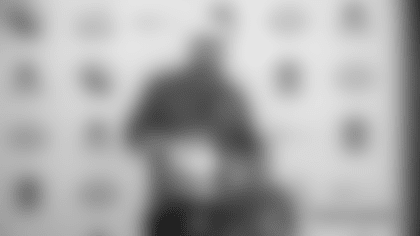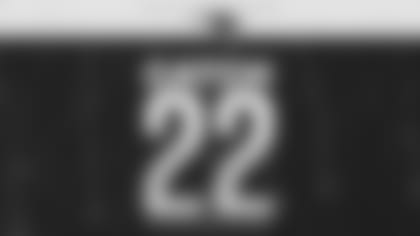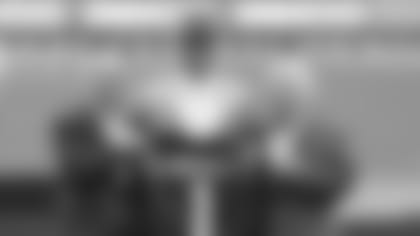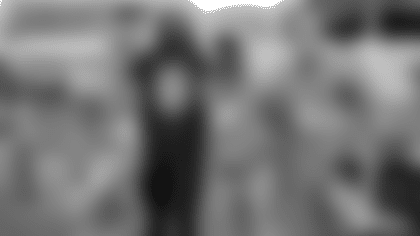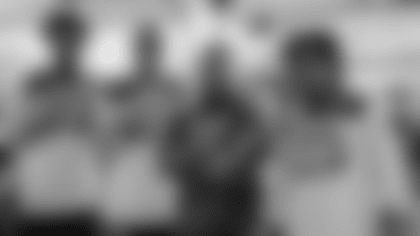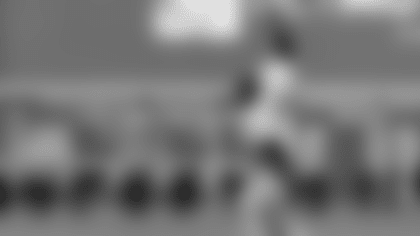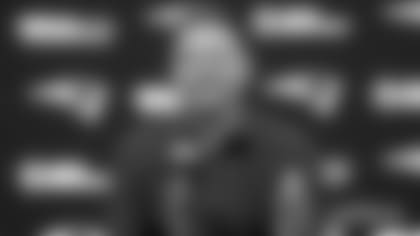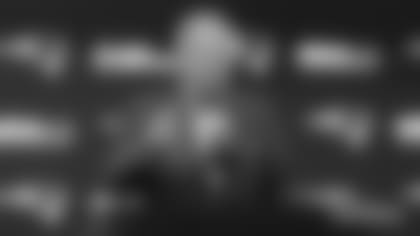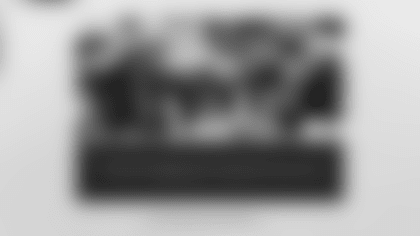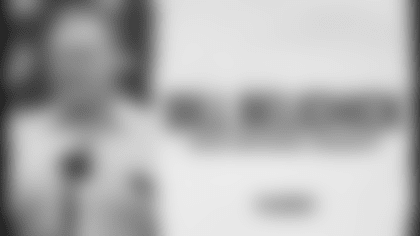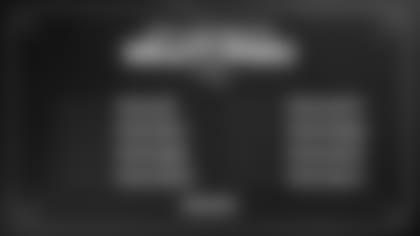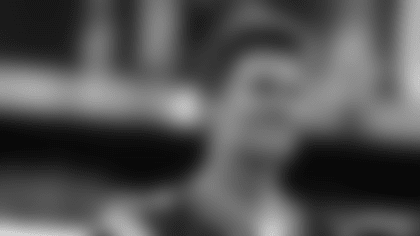BILL BELICHICK, HEAD COACH
[wysifield-embeddedaudio|eid="511941"|type="embeddedaudio"|view_mode="full"]
Q: How important is the ability to tackle well from players in the secondary? How big of a factor is that for you in the evaluation process of a player in the secondary?
BB: I'd say it's a big part of it. It starts at the top. If you want good tackling then you need to have good tacklers and that's certainly coaching and fundamentals and all that goes into it, but like anything else some guys are better at it than others. I think there's definitely a premium on that. In the end there is something to be said for breaking up passes certainly, but after that and more frequently than that you've got to get the other guy on the ground. You've got to tackle him. That's what defensive football and special teams is and coverage is. You've got to get the guy with the ball on the ground. If you put 11 good tacklers on the field then that ups your odds. If you only have seven or eight out there then you've got to be able to make up for that in some other way but it's hard. We emphasize it like I'm sure every team does. It's important to us. I think overall there's been a few times but not very many times where I've willingly put players on the field defensively that I knew weren't good tacklers. But if a player is an exceptional coverage player sometimes there's a tradeoff there. He's got to be really good at that to offset if tackling is a weakness is the way I see it.
Q: Was Matt Lengel's running ability a surprise to you given his pretty unique size and length at the tight end position?
BB: Well, you know, a lot of those guys that are long, whether it's a player even like Randy [Moss], they chew up a lot of ground in a couple of strides. And so sometimes it doesn't appear that they're moving as fast as a player with a shorter stride but just turning over faster, but they're actually running faster and covering more ground. The time we had on him coming out I'd say I think he runs and plays a little faster than that. But yeah, you know, a lot of it is game speed. The timed speed is the timed speed but game speed is game speed. He runs well in practice. He's able to cover ground getting down the field, but again, length is definitely a part of that because when you're throwing to a big guy, whether it's a guy like Randy or Rob [Gronkowski] or [Matt] Lengel, it's just a lot bigger target so you don't have to get as much separation or get as far behind the player that's covering you. You just have to be able to get a little bit behind him and have some space where the quarterback can put the ball.
Q: What have you seen from Vincent Valentine as of late, and likewise what kind of a year do you think Malcom Brown has been having?
BB: Well, I think Vince [Valentine] is improving. He's still got a ways to go. There are a lot of things he is working on, he's gotten better at, but it's a different game in there. Especially for us where we play guys like him in different spots. Sometimes he's on the center, sometimes he's in the gap, sometimes he's on the guard, sometimes he's in a three-technique. He's making progress. He's coming along. Malcom [Brown]'s had some good moments. We're just looking really for more consistency there. [Alan] Branch has been by far our most consistent defensive tackle. The other guys can shoot to get up to his level.
Q: What are some of the characteristics that you've seen from this Dolphins team that has allowed them to rebound from their poor start to the season?
BB: Right. Well I think you've seen the Dolphins make plays in a lot of different areas. It hasn't all been one thing. They've made plays defensively, offensively and in the kicking game. They had the kickoff return against the Jets. They had the 55-yard field goal last week in Buffalo to send it into overtime. [Kiko] Alonso had the interception against San Diego and ran it back for a touchdown that kind of sealed that game. They've had some big runs from [Jay] Ajayi and obviously [Jarvis] Landry has given them a lot of plays. It just seems that it's one of those years and they kind of have that, whatever you want to call it, that type of season where it's just whatever it takes. Whatever it takes, somebody is making it for them. That's the mark of a good team is having good players in all areas and making the plays when they count. Not that plays in the first quarter aren't important - they are - but you get to those plays at the end when everything hinges on the last minute or two and those first 15 minutes came out about even and now it's down to just a play or a drive or a possession or whatever. That's where you've got to have your best execution and your best football and that's usually where your best players step up and come through for you.
Q: Despite ultimately losing the game, did their comeback effort against you in Week 2 show you that they would be a resilient team down the stretch?
BB: Well, I mean they have a lot of good players. They have a lot of disruptive players. They were able to turn the ball over. They have a lot of explosive players offensively so there's a lot of that in this league. You see it's so evenly matched sometimes it doesn't go back and forth and have seven or eight lead changes. Sometimes one team gets out and then the other team comes back. But look, they've been the best second half team in the league and they've been a great fourth quarter team. They've done it multiple games throughout the course of the season so there has got to be something to it.
Q: Given the nature of the quarterback situation back in Week 2, how different will this matchup be in terms of what you can expect from their defense and the game plan you'll use now to attack them as opposed to the game plan earlier?
BB: Well, I mean we'll certainly take a look at that game and we'll factor that in but it was a long time ago. There was a lot of water under the bridge for both teams in terms of personnel but also just the development of your team, the improvements that both teams have made in that, whatever it is, three month period. Even if it's the same players it's not the same. We'll look at that game as part of the overall picture but the Dolphins have played a lot of good football in the last three months so I think that's really the overriding factor for us is to prepare for what they've been doing, what they've been successful with. I mean we didn't see [Jay] Ajayi. We saw [Arian] Foster who was a good player but this is a whole different deal. There's some relevance but it's not quite like looking at like last year's film, but it's close to that.
JOSH MCDANIELS, OFFENSIVE COORDINATOR
[wysifield-embeddedaudio|eid="511946"|type="embeddedaudio"|view_mode="full"]
Q: Have you seen Miami use different or specific packages on third downs compared to the ones they use on early downs that's led them to become the first-ranked third-down defense?
JM: They do a lot of different things on third down, but I would say the thing that they do the best is they challenge you at all three levels. They have a really good pass rush. Obviously, they have a lot of guys that can be effective in getting to the quarterback and creating pressure so you force the ball out before you really want to. They get on you tight in the secondary and really challenge your ability to get open versus man coverage, and then they have a pressure package that they have some different unique looks that they will give you and challenge your ability to pick up pressures in those types of situations, and they execute them very well. I think the thing that stands out to us is they have more third-and-10-plus situations than they do any other situations, and I think any time you play a defense that creates more long-yardage situations than they have shorter distances to defend, you're usually going to find that they're ranked highly in third down efficiency, and that is the case with Dolphins.
Q: When you say more third-and-10-plus situations, is that league-leading?
JM: I don't know if they lead the league, I just know that they have an inordinate number of third-and-longs as we're studying them. They have more third-and-10-pluses than they do any other distance that you're talking about on third down. To put the offense in those types of situations obviously goes a long way into being effective on third down as a defense. Part of our challenge will be to play efficient, effective early down offense to try to avoid putting ourselves in those types of situations down there on the road.
Q: You typically determine your lead back and plays in the running game before going into the game or is that more of a feel thing?
JM: I think you go into each week trying to put your players in the best situations for them to be effective and help the team produce, so we're always conscious if there is something that somebody does well, we want to let them do that more, and if there is something that somebody else does well in a different area, then we'll try to allow them to do that a little bit more. I think in the game, certainly, we have a lot of guys that can contribute and help us win, which is really the goal. As you're going through the game, there are a lot of variables that can really affect how you continue to either play the game, call the game. I think the most important thing is, what are you executing well and where are you having the most success moving the ball and trying to score points with? Sometimes that changes in the middle of the second quarter and sometimes it's exactly as you hoped it would be during the course of the game-planning process. I think you just have to be able to be flexible with it, but I know we go into the game feeling very good about the impact that all of our guys are going to potentially have on the game at whatever position they play. At times the game can take a turn and you say, 'We're having a lot of success doing this, let's do this more,' or, 'This is really working better than something else, let's stick a little longer with this.' Bill [Belichick] has a great sense of that as he's watching and giving me input during the course of the game and hopefully, our guys on our sideline, our staff, they do a great job of doing the same thing. We're always trying to figure out what the best thing is to do after each series, moving into the next series, moving into the next quarter or the next half of the game. Sometimes that means making an adjustment to your initial plans and sometimes it means going and continuing to stick with what you had because you can make it better even though it didn't necessarily turn out perfectly the first few times you used it. I think there's a balance there and I think that you've got to make some decisions during the course of the contest about what you can and can't fix and how much time you have left and all the rest of it. Ultimately, our responsibility is to move the ball, get it into the end zone, and whatever we think the best way to do that is at any point in time, hopefully we'll make the best decision for the team.
Q: How have the Dolphins been able to overcome injuries to guys in the secondary and what are your thoughts on players like Xavien Howard and other young guys who have performed for them back there?
JM: Yeah, they've played a lot of different guys. We've seen a lot of different guys, not only in the early part of the season when we played them, but in all of our film preparation the last few days, we've definitely - they've played a lot of different people in multiple spots on their defense and [they] now have experience. They're a confident group, they create turnovers, like I told Mike [Reiss] earlier, they put you in a lot of long yardage situations with negative plays and pressure on the quarterback. Sometimes it doesn't always equate to sacks, but when they get pressure on the quarterback and you throw two incomplete passes and you're in third-and-10, that's a bad situation for the offense to be in against this group. They play a very sound defensive system. They challenge you in a lot of different areas, they give you a lot of different looks. They don't sit in one thing and do it the whole game. They play zone, they play man, they blitz, they cover, they rush four. They do a lot of different things that are going to force you to really be on top of your game as you go through each quarter of the game and each series that you're out there on the field. I think they've got a lot of good players at a lot of different spots that have gained a lot of valuable experience as the season has gone on and this is going to be a great test for us down there on Sunday afternoon.
Q: What does it say about Adam Gase, a guy that you coached with in Denver, to have started out 1-4 with the Dolphins this year and bounced back now to 10-5?
JM: Yeah, Adam [Gase] is really a mentally tough guy. He's very smart, works his butt off to try to get his group, or his team in this case, to do all the right things that it takes to win. I think you've seen a consistent approach. I think you saw a style of leadership that didn't flinch in the face of some early losses during the course of the season. He stayed with his plan and his process and obviously that's paying big dividends for him now. They're playing very well, as good as any team in the league; they've won nine of their last 10 games. They're playing the type of football that he wants them to play. They don't beat themselves, they create turnovers, they take care of the ball, they're running the football, they're controlling the game, they're getting ahead early in the game and they're doing the things that they want to do. That doesn't surprise me at all. Adam is a very, like I said, hard-working, smart, consistent, good leader; knows how to win and has put a program in place down there that is very difficult to beat. Like I said, it will be a great challenge for us this week. We're excited to have an opportunity to go down there and play on Sunday.
Q: When you go back and watch film from your first meeting with the Dolphins this year, how much do you take into consideration that Jimmy Garoppolo was the starter with Jacoby Brissett coming in later on when you're game planning - assuming Tom Brady will start on Sunday?
JM: I think there are a lot of things that - I mean, there is a lot of time that has passed since we played them, that's for sure. There are a lot of changes in terms of some people that we have playing for us. There are a lot of guys that were playing for them that aren't playing this week, whether that's [Koa] Misi or [Reshad] Jones, or some different guys there. [Earl] Mitchell didn't play in our first game, so there are some things that you learn from, there are some things that you watch and you take note of because I think that's definitely a part of the process of preparing for this game when you play a team for the second time. At the same time, I think we both understand that we've changed, we've evolved, we've grown, they've grown, they've changed, they've evolved. Hopefully, you're playing your best football at this time of the year, so I think you take stock in what you did, but you certainly can't just go back and look at only that because I think we're talking about two different teams at this point and time in the season.
*Q: How well do you think Matt Lengel runs for a player that is maybe plus-size at the tight end position, and also what are your thoughts on Michael Floyd's initial Patriots debut? *
JM: Yeah, Matt [Lengel] has worked hard since he got here. He's demonstrated the ability to compete and do things at the tight end position that can help us win, whether that's running up the field, catching the football, blocking, pass protection. There are a lot of different things we ask of that position and he's really tried to do as much as he can to get acclimated to that so that he can perform his assignments on game day. He's had a few more opportunities as we've gone through the last month here and he's trying to capitalize on every one of those. I think his ability to help us impact the game has been productive and he's got a long way to go. We've got plenty of work still ahead of us to try to work and improve him and that's what all of our players are going to do as we head into the final game of the regular season. And just again, I think it was important for [Michael Floyd], he went with us to Denver, got to kind of see how we do things, then he got to experience a normal week, or as normal as he could last week. It was a little shorter than normal, but just our whole preparation, our practice, how we go about implementing the game plan and then go out there and experience a game day where he's active, he's in the huddle, he's hearing how we work on the sideline and all the rest of it. Again, I think it was good for him to have that experience and go through that. He got his feet wet, caught his first ball, had a couple targets, blocked in the running game, got to experience some different things on third down and in the red area. I think each day, hopefully, we're working hard with him and he's working hard to catch himself up as best he can and to learn the game plan and what we may ask of him this week, and each day obviously gives us a great opportunity to take a step forward.
MATT PATRICIA, DEFENSIVE COORDINATOR
[wysifield-embeddedaudio|eid="511951"|type="embeddedaudio"|view_mode="full"]
Q: What type of running back is Jay Ajayi in terms of the challenges he presents? How did you feel your communication went without Dont'a Hightower during last week's game?
MP: Sure, I'll start obviously with Miami. [Jay] Ajayi [is] obviously a very good running back. A guy that has really kind of inspired their offense here I would say kind of as of late. I think he's one of the top backs here in the league since Week 6. [He] runs extremely hard, I would say even runs violent. You know the guy just comes downhill with an extreme force and really does a great job with the stretch-run game. They have a couple different schemes that they run with him but basically just putting him on a track where he can get downhill as fast as he can, he really attacks the C-gap hard. He gets kind of that one cut, downhill momentum going, can quickly get to the line of scrimmage, break into the secondary and then obviously has a big advantage when that happens. I think the guy has enough speed and good quickness to get to the edge. You can see him definitely get to the edge of the defense and getting around the corner. There are a lot of plays where he just - he'll run about eight yards before anyone has really had the chance to get on him. I think the offensive line is doing a great job with the scheme of covering guys up and being able to get their hands on them, really making it difficult to find him in the backfield. The offensive line, they're all big and long guys. They're athletic guys so it's hard to kind of see him as he's running through those lanes in behind them then all of a sudden he's on you coming full speed downhill with all that power and force. He's got the ability to break big plays very quickly and turn things into those long runs. I think they're really feeding off that energy. He runs with a lot of excitement and good pad level and I think that's kind of what's fueling them right now as far as the run game is concerned, so definitely a major problem. He's obviously a great back and having a tremendous year. Certainly the first and foremost thing, too, we've got to try to get handled in the game. Hopefully that gets you there. The second part of the question, as far as the game the other day I think those guys - the linebackers, the defensive ends, the safeties kind of as a collective group - did a good job of communication and really trying to make sure that within the game plan everybody was kind of on the same page with the calls, the checks and the adjustments. Devin McCourty and Pat Chung [Patrick Chung] from the secondary in the middle of the field, the safety positions communicate a lot with the linebackers and the linebackers then to the defensive ends and the defensive tackles. There's quite a bit of communication besides just the huddle call that goes on there. But all of those guys - certainly with Kyle Van Noy - he had the helmet there for a little while and there were some other situations where some of the other guys had the huddle or the communication for the play call even if they didn't have the helmet communication. We kind of just mixed that up and made sure we were solid across the board. That's kind of how that went.
Q: What did you see from Jay Ajayi as a pass receiver?
MP: Yeah, I lost you there for a little bit but just as a pass receiver, I think they do a good job actually with all their backs and you'll see them in there quite a bit. But with Jay [Ajayi], getting the ball to him in space and some of those different things they're able to do in the passing game now where he has a lot of room to work with the ball in his hands is obviously very dangerous for us as a defense. They do scheme up some things with him and [Damien] Williams to get those guys the ball in space or maybe on some quicker type of routes where they can catch-and-run if you will and get the momentum going downhill. It's kind of like it's an extension of their run game. If you can get the ball to them in space - maybe it's a shorter pass or whatever the play may be - it's basically like the same kind of scenario. They've gotten though the line of scrimmage and now you have them in a situation where they're one-on-one in the secondary and they've been able to produce some pretty big plays there. Certainly that's part of it. They both catch the ball well. They can get out in space and grab the ball without a problem. So it's just another way for them to be dangerous with the ball in their hands.
*Q: Does you team put a high value on bringing players in, especially in the secondary, who have that fundamental ability and willingness to tackle? How do you stay sharp on tackling full-contact during this day in age where there is less opportunity to do so? *
MP: Yeah, that is such a critical part of the game right now - tackling just in general. I think it really starts at the young levels. That's just kind of my opinion on it. I don't think tackling is taught enough. I think in general we don't spend enough time on it with the younger guys and younger kids coming up and just teaching good tackling form. I really do think there is kind of a resurgence of that because I think it's kind of recognized now that we really have to start teaching these guys to tackle properly so that they can keep their heads out of certain situations and learn how to wrap up and be able to drive with their legs. Those fundamentals of pad level to be able to tackle what we call in-line and then out in space where there are different scenarios that come up where you have to protect your leverage when you're trying to go after a ball carrier or wide receiver or whatever the case may be. So certainly for us it's huge. Tackling is huge. We try to work on it every day. We have different drills that we'll go through. We have drills that we can do obviously wearing pads which are great. That's where you want to do it the most. Then drills that we can do to kind of redefine the fundamentals without pads on because unfortunately that's kind of where we're stuck for the majority of the year, especially when you get to this time of the year where those padded practices are eliminated or you don't have that many opportunities. I think that's where you start to see a breakdown in a lot of those fundamentals - pad level just being number one, tackling being number two - where guys just tend to get high because you're not used to being in pads and practicing it throughout the week. So it has got to be a big point of emphasis throughout the week that we finish on those types of plays. Then certainly with some of the equipment or bags or whatever you want to call it nowadays that the manufacturers sell, there's different drills that you can try to get some fits on the bags or the pads or some different movement-type of equipment that we have where you can still get the fit, you can get the hip drive, you can work on your angles and your approach to the player out in space so you can keep your leverage and maintain your leverage. There are different scenarios that come up with tackling as far as is it a one-on-one tackle? Is it a two-on-one tackle? Do you have somebody else to use from a leverage standpoint or sideline? Or kind of what's your angle to the approach that you have for that particular play? Then just the value for us defensively. I mean all of our players, certainly when we go into that evaluation mode of guys we're always trying to see how well they tackle, how well they tackle in space in a one-on-one scenario in-line, because when you're trying to tackle in traffic sometimes that becomes a whole different scenario that presents itself, trying to get through traffic. It may not be as clean as the tackles you would have if you were in open space. So you're trying to get your head across trying to get a better wrap and try to drive through the guy. It may not all happen because of the restriction down inside. Certainly something we look at. I think from a secondary standpoint, guys that are in the deep part of the field, why it's so critical for those guys is because obviously there is no one behind them. So if those guys miss a play, miss a tackle, then those turn into really large gains or obviously scores at that point. So we really spend a lot of time on it. We start in the spring. We go all the way through the season. We try to make sure there is an emphasis on it. I do feel that as the season goes, I think that becomes harder to do and we try to make sure that we keep the focus on it as much as we can.
Q: Has your secondary performed well with tackling, especially the Rutgers guys?
MP: Yeah, I would say it's more than just the Rutgers guys. I think those guys in general, they do understand the importance of it so they do work really hard at it and they try to make sure that they are. I would say that even the guys that maybe come and aren't great tacklers you definitely see improvement with them. So we've still got a couple games here so hopefully we can continue to tackle well. It is a huge emphasis for us, absolutely, and I think those guys do a really good job at it.



